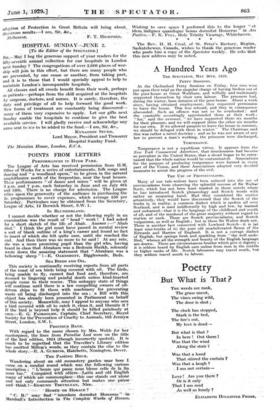A Hundred Years Ago
THE SPECTATOR, MAY 30TH, 1829.
PETTY SESSIONS.
At the Chelmsford Petty Sessions on Friday, four men were put upon their trial on the singular charge of having broken out of the poor-house at Great Waltham, and wilfully and maliciously supported themselves by their own labour. The prisoners had, during the winter, been inmates of the poor-house. About a week since, having obtained employment, they requested permission to leave the house. This was refused, and they in consequence absconded. Such an offence was not to be overlooked ; and the constable accordingly apprehended them at their work ; "for," said the overseer, we have supported them six months for their pleasure, and we will support them the other six months for our own. If we allowed paupers to leave the house in summer, we should be deluged with them in winter." The Chairman said this was rather a novel doctrine ; and as he was not aware of any law to prevent a man's working, the prisoners were discharged.
TEMPERANCE.
Temperance is not a republican virtue. It appears from the New York Commercial Advertiser, that drunkenness had become so prevalent in the United States, that a dread began to be enter- tained that the whole nation would be contaminated. Associations for the purpose- of producing tedtperance were formed in every part of the Union, and these Associations adopted very decided
measures to arrest the progress of the evil. .
• . THE USE OF PROVINCIALISMS.
Many of our tale-writers have been seduced into the use of provincialisms from observing the splendid -success of- Sir Walter Seott, .which has not, been least marked in . those novels..wheze he has introduced Scotch phraseology and Scotch words with rnther an unstaring hand Had they considered the inatter attentively,- they would'- have -discovered that the Scotch of the books is, in reality, a common dialect which is spoken all over Scotland, and is used indifferently by high and low, by learned and unlearned—that it is the language of the childhood and youth of all, and of the manhood of the great majority without regard to station or rank. There are Scotch provincialisms, and Scotch vulgarisms, as well as English ; but in these Sir Walter deals not. There is another fact connected with Lowland Scotch—it is (at least nine-tenths of it) the pure old unadulterated Saxon Of the Edwards and Harries of England. It is not a corrupt dialect of English, but springs fresh and sparkling from "the well .unde- filed," whence all the strength and beauty of the English language are drawn. There are circumstances besides which give it dignity : it is seldom heard by English ears unless from men in the middle or higher ranks of life. Scotch labourers may travel south, but they seldom travel south to labour.










































 Previous page
Previous page